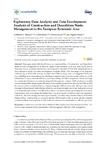Exploratory Data Analysis and Data Envelopment Analysis of Construction and Demolition Waste Management in the European Economic Area

Use este enlace para citar
http://hdl.handle.net/2183/25955Colecciones
- Investigación (FIC) [1679]
Metadatos
Mostrar el registro completo del ítemTítulo
Exploratory Data Analysis and Data Envelopment Analysis of Construction and Demolition Waste Management in the European Economic AreaFecha
2020-06-18Cita bibliográfica
Taboada, G.L.; Seruca, I.; Sousa, C.; Pereira, Á. Exploratory Data Analysis and Data Envelopment Analysis of Construction and Demolition Waste Management in the European Economic Area. Sustainability 2020, 12, 4995.
Resumen
[Abstract]
This paper deals with the efficiency and sustainability of Construction and Demolition Waste (CDW) management in 30 Member States of the European Economic Area (EEA) (the 28 European Union countries plus Norway and Iceland) for the period 2010–2016 using Exploratory Data Analytics (EDA) and Data Envelopment Analysis (DEA). The first stage of the proposed methodology is EDA with already available (the CDW recovery rate) and suggested indicators (e.g., building stock characterization, dwelling occupancy ratio, macroeconomic ratios and CDW breakdown) to characterize the efficiency and sustainability of CDW management. The second stage is to assess the efficiency of countries using DEA through two original CDW production models, one for sustainability, measuring the efficiency of the construction sector for reducing its CDW, and the second a model to score the efficiency of maximizing the CDW recovery rate. The main outcome of the paper is the proposed methodology, which is a candidate for replacing current indicators in order to evaluate the performance of CDW policy, due to is adaptive nature, promoting the continuous improvement and overcoming the limitations of the poor quality of metrics, data and parametric indicators. The methodology has been experimentally validated using Eurostat data for 30 Member States of EEA, ranking them according to the two DEA model scores, to point out the countries considered efficient among those of their scale, as a reference for sustainable and efficient practices.
Palabras clave
Construction and Demolition Waste (CDW)
Exploratory Data Analytics (EDA)
Sustainable CDW management
Efficient CDW management
Data Envelopment Analysis (DEA)
Exploratory Data Analytics (EDA)
Sustainable CDW management
Efficient CDW management
Data Envelopment Analysis (DEA)
Versión del editor
Derechos
Atribución 4.0 España
ISSN
2071-1050






